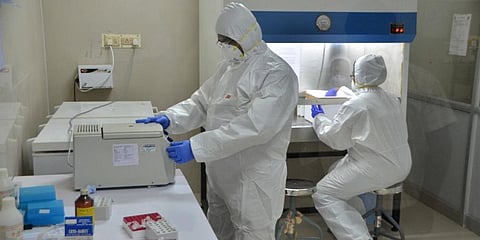

NEW DELHI: As the number of coronavirus patients in India is surging, those developing serious complications are being given a combination of anti-HIV and anti-malaria medicines along with Tamiflu — an antiviral drug used in the treatment, However, most patients are being treated with antipyretics, this newspaper has learned.
So far, at least 6 patients from in Jaipur, Gurugram and Delhi who had developed severe pneumonia and other complications are being given the repurposed drugs. But least two of them are still not out of danger, sources said.
A doctor who is treating some of these patients in Delhi said with the requests for anonymity that the Central Drug Standards Control Organisation had approved Lopinavir and Ritonavir — a fixed-dose combination used in HIV patients for coronavirus cases. The clinicians are also resorting to several other drugs that have shown some degree of efficacy against the efficacy elsewhere.
“Many doctors who are treating these patients wait for signs of deterioration in patients and then treat them with multiple drugs hoping that at least one will work,” said a senior doctor in the capital.
In Jaipur’s SMS medical college, a 69--year old Italian and his wife, who were the first ones to receive a course of anti-retroviral drugs for 14 days apart from drugs used in malaria and influenza are said to be stable now.
In Gurugram’s Medanta Hospital where 14 Italians are under treatment for infection, a 77-year old woman however is still said to be critical despite a long course of these drugs and is on ventilator support.
Dr Dhruva Chaudhry, president of the Indian Society for Critically Care Medicine who is working with the government on treatment guidelines for clinicians said that as coronavirus is closely linked to SARS-CoV-2 virus — the anti-retroviral drugs for the SARS are showing some efficacy against the infection.
According to the World Health Organisation (WHO), while most people with coronavirus develop mild or uncomplicated illness, approximately 14% of them develop the disease requiring hospitalization and oxygen support and 5% require admission to an intensive care unit.
In severe cases, the virus can be complicated by acute respiratory disease syndrome, sepsis and septic shock, multiorgan failure, including acute kidney injury and cardiac injury. Geriatric and co-morbid diseases have also been reported as risk factors for death.
“It is the latter category of people that we are worried about because mild cases can just be monitored and treated with Paracetamol,” said Dr Chaudhry.
The Indian Council of Medical Research (ICMR), in its guidelines on clinical management of coronavirus, recommended anti-retroviral drug therapy for patients with organ dysfunction.
But won't that be too late? “Nobody knows the answer to that question, but the anti-HIV drugs which have side effects such as severe allergy and liver dysfunction cannot be used indiscriminately,” said a doctor, adding, with little chance of a vaccine being available before at least one year, a more targeted drug is the only hope.